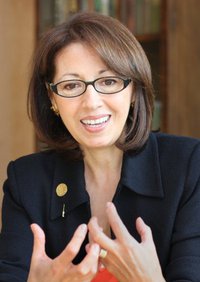
Jonathan Yardley’s essay on Marie Arana
 Marie Arana is truly a citizen of the hemisphere. Her writing explores and embraces both continents of the Americas, just as she herself has done throughout her life. Born in Lima to a Peruvian father and a Yankee mother, she is equally at ease in both of their cultures. She holds dual citizenship in Peru and the United States, owns residences in both countries, and is passionately loyal to both. In recent years, as the Latino presence in the United States has become ever larger and more important, she has labored tirelessly to explain each culture to the other.
Marie Arana is truly a citizen of the hemisphere. Her writing explores and embraces both continents of the Americas, just as she herself has done throughout her life. Born in Lima to a Peruvian father and a Yankee mother, she is equally at ease in both of their cultures. She holds dual citizenship in Peru and the United States, owns residences in both countries, and is passionately loyal to both. In recent years, as the Latino presence in the United States has become ever larger and more important, she has labored tirelessly to explain each culture to the other.
She has made biculturalism and all its ramifications the central themes of her writing. To date her main subject has been Latin America generally, Peru specifically, and she has written relatively little about the United States apart from a number of passages in her much-honored memoir, American Chica: Two Worlds, One Childhood. In another sense, though, the United States is absolutely central to her work, because she writes solely in English. Thus her work is by its very nature bicultural and cross-cultural, taking on many of the themes that engaged the great writers of the Latin American “Boom” – Gabriel García Márquez, Carlos Fuentes, Julio Cortázar, Mario Vargas Llosa – but in English and from a vantage point that is as much North American as South.
Arana is sympathetic to the literary avant garde, from Vladimir Nabokov (one of her favorite writers) to Roberto Bolaño, but though her own prose is often highly inventive she does not play word games. Her prose reflects her deep interest in and knowledge of linguistics (in which she has an M.A.) and languages. She is fluent in Spanish, English, and French, majored in Russian at Northwestern University and still speaks and reads it easily, has “street” Italian and Mandarin Chinese. Though she spoke English as a small girl thanks to her mother, she was immersed in the Spanish-speaking environment of Lima and the other places in Peru where her family lived, which makes it all the more remarkable that English is now her primary tongue and that she writes it with such remarkable fluidity.
Apart from Nabokov and the aforementioned writers of the “Boom,” the writers whose work she most cherishes include Fyodor Dostoyevsky, Jorge Luis Borges, Vladimir Voinovich (whose work she edited in the 1980s while working at Harcourt Brace Jovanovich), Flannery O’Connor, Joseph Conrad, Leo Tolstoy, Stanley Elkin (whose work she edited at Simon & Schuster), and Jane Austen. A number of reviewers of her novel Cellophane pigeonholed it as “magical realism,” but though she was flattered to be compared to the likes of García Márquez, she rejects the term itself. Her work, like that of the older Latino masters, is grounded in the quotidian reality of Latino life, which includes connections to the spiritual and the otherworldly that are not “magical” in the eyes of those who experience them but simply life itself.
Arana’s prose can be lyrical, as in American Chica and (most particularly) Cellophane, but she is equally capable of writing in a lean, muscular style, as in her novel Lima Nights or in the many pieces of journalism she has done since joining The Washington Post in 1993. Her writing style derives not merely from her linguistic training and deep reading in literature, but from her passionate love of music. She is an accomplished pianist; a Steinway baby grand is the centerpiece of her living room in Washington, and she only wishes she had more time to play it. Her musical tastes run, literally, from Mozart to Motown. As a child, she studied ballet with Alexandra Danilova and dreamed of being an opera singer. She loves Bach, Mendelssohn, Chopin and Rachmaninoff, but she also loves Neil Young, Joe Cocker, Marvin Gaye and Santana.
Apart from music, her favorite activities revolve around the kitchen and her family. She is an accomplished and inventive cook whose specialty is Peruvian cuisine, which in recent years food lovers everywhere have come to appreciate as among the world’s best. She cooks Peruvian whether she’s in Washington or Lima, but prefers the latter because the essential ingredients – potatoes, limes, seafood, Pisco brandy – are native and fresh. When they are in Lima, she and her husband are frequent patrons of the city’s incredible restaurants, always beginning lunch with a bright, tart Pisco Sour.
She has two grown children: Adam, who works for a division of Apple in Silicon Valley, and Lalo, who lives in London with her husband, Jeff Walsh. Their two sons, Aidan and Ryder, are endless joys to Arana, though no one who sees her can believe that she is actually a grandmother.
—Jonathan Yardley
Washington, D.C.
June, 2010
